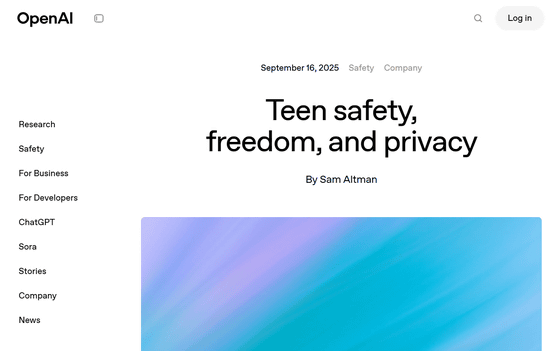OpenAI announces ChatGPT will automatically detect users under the age of 18, CEO Sam Altman says 'we prioritize safety over privacy for teenage users'

OpenAI CEO Sam Altman announced a new user policy that includes significant changes to how ChatGPT interacts with users under the age of 18. 'We prioritize the safety of teenagers over their privacy and freedom,' Altman said.
Teen safety, freedom, and privacy | OpenAI

Building age prediction | OpenAI
https://openai.com/index/building-towards-age-prediction/
OpenAI will apply new restrictions to ChatGPT users under 18 | TechCrunch
https://techcrunch.com/2025/09/16/openai-will-apply-new-restrictions-to-chatgpt-users-under-18/
In August 2025, a family filed a lawsuit against OpenAI, alleging that ChatGPT contributed to a child's suicide. In response to these issues, OpenAI announced four priority areas: expanding support for people in crisis situations, making it easier to contact emergency services and obtain professional help, enabling connections to trusted contacts, and strengthening protections for teenagers. The company revealed that it is making intensive efforts to introduce countermeasures by the end of 2025.
Then, in early September 2025, OpenAI announced that it plans to introduce guardrails by the end of 2025 to ensure that teenagers and people with mental health issues can use ChatGPT safely.
OpenAI announces plans to add parental control features to ChatGPT - GIGAZINE

'Some of our principles conflict with each other, and I want to explain the decisions we're making about the tensions between teen safety, freedom, and privacy,' Altman said in a blog post at OpenAI.
'(As a first principle) it is vitally important to us and to society that the right to privacy in the use of AI is protected. People are increasingly telling AI personal details, which is different from previous generations of technology. We believe it is in society's best interest that that information be privileged and afforded a higher level of protection. We believe the same level of protection should apply to conversations with AI, which people are increasingly relying on for sensitive questions and personal concerns. We advocate this point with policymakers. We are developing advanced security features to ensure that users' data remains private, even from OpenAI employees. As with other categories of privilege, certain exceptions exist. For example, automated systems will monitor for potential serious misuse, and the most serious risks, such as threats to someone's life, plans to harm others, or societal harm like a major cybersecurity incident, may be escalated for human review.'
'The second principle is about freedom. We want users to be able to use our tools in the way they want, within a very broad range of safety. As our models become more controllable, we've worked to expand user freedom over time. For example, our models' default behavior is to not engage in much flirtatious conversation, but if an adult user asks for it, it should. To take a more difficult example, our models shouldn't provide instructions on how to commit suicide by default, but if an adult user asks for help writing fiction depicting suicide, the model should accommodate that request. 'Treat adult users as adults' is how we say this internally, and the idea is to expand freedom as much as possible without harming others or reducing their freedom.'

by TechCrunch
'The third principle is about protecting teens. We prioritize safety over privacy and freedom for our teenage users. This is new and powerful technology, and we believe minors need adequate protection,' Altman said.
Specific measures include training teenage users to 'not engage in suggestive conversations or discuss suicide or self-harm, even in creative contexts, even if requested.' OpenAI also built an 'age prediction system that estimates age based on ChatGPT usage,' distinguishing between under-18 and over-18 users. If a user's age is in doubt, the app will default to a safer experience. In some cases and countries, users may also be asked to provide identification.
'We understand this represents a compromise in privacy for adult users, but we believe it's a worthwhile trade-off,' Altman said.
Related Posts:
in Software, Web Service, Web Application, Posted by log1i_yk






